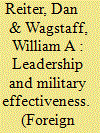| Srl | Item |
| 1 |
ID:
172180


|
|
|
|
|
| Summary/Abstract |
What shapes the types of services terrorist and insurgent groups provide? Research on these organizations provides mounting evidence that understanding the nonviolent strategies of violent groups is critical to a complete picture of conflict dynamics. We add to this work, using a longitudinal measure of terrorist service provision coverage across a number of service sectors to evaluate hypotheses concerning the drivers of terrorist service provision to understand which services groups provide. Here, we are interested in understanding patterns of service provision: which groups provide services where, and whether and how that decision is reactive to the state context. Specifically we look to see if groups are likely to provide services as complements or substitutes to the state in the competition for constituents. We find terrorist groups challenge the state in service provision in less capital-intensive sectors, such as education, while avoiding competition in more capital-intensive sectors, such as healthcare. We also find service provision varies over a group’s lifetime, likely in response to counterterrorism efforts. As a group ages and strengthens, it is also more likely to provide a broader array of services. Finally, we observe that service-providers tend to have longer lifespans.
|
|
|
|
|
|
|
|
|
|
|
|
|
|
|
|
| 2 |
ID:
162770


|
|
|
|
|
| Summary/Abstract |
What determines military effectiveness? Though political scientists have studied the sources of military effectiveness, they have generally ignored the role of military leadership, a factor that historians have emphasized as crucial for effectiveness. This article presents the first rigorous examination of the proposition that militaries improve effectiveness by replacing low-performing leaders. The article tests three theories describing how militaries promote and demote leaders: (1) military leaders are promoted and demoted on the basis of combat performance; (2) political leaders fearful of coups do not demote low-performing military leaders, as a coup-proofing tactic; and (3) military leaders that belong to powerful interpersonal networks are less likely to be demoted and more likely to be promoted. Hypotheses are tested using new data on all American and German generals holding combat commands in the North African, Italian, and West European theaters in World War II and new data on the monthly combat performance of American and German divisions in these theaters. Analysis reveals that both armies replaced low-performing generals (coup-proofing motives did not prevent Hitler from demoting low performers) and that interpersonal networks in the US army did not block demotion of low performers. Also, the replacement of low-performing generals improved combat effectiveness in both armies.
|
|
|
|
|
|
|
|
|
|
|
|
|
|
|
|